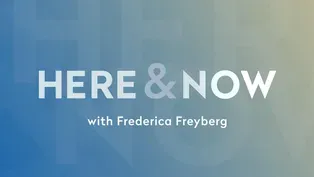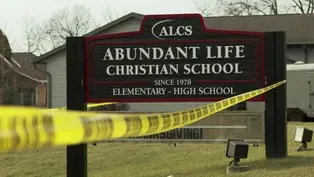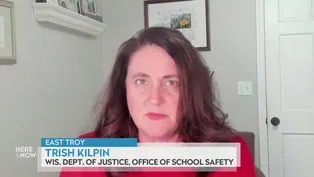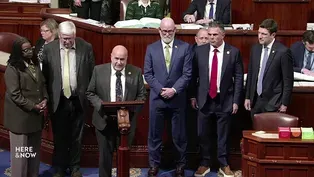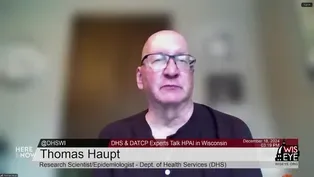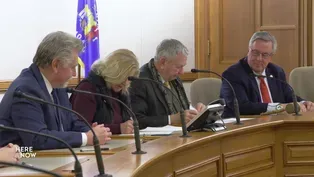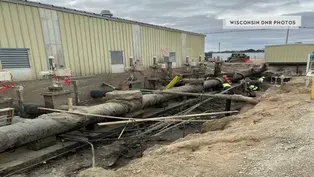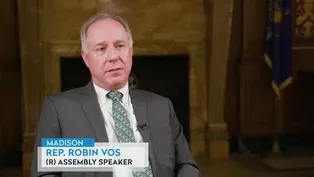Here and Now
Erin Neill on the emotional impacts of experiencing violence
Clip: Season 2300 Episode 2324 | 5m 13sVideo has Closed Captions
Erin Neill on traumas experienced by survivors and families following violent acts.
HEART Counseling psychotherapist Erin Neill describes overlapping traumas experienced by survivors, families and communities following violent acts like the shooting at Abundant Life Christian School.
Problems with Closed Captions? Closed Captioning Feedback
Problems with Closed Captions? Closed Captioning Feedback
Here and Now is a local public television program presented by PBS Wisconsin
Here and Now
Erin Neill on the emotional impacts of experiencing violence
Clip: Season 2300 Episode 2324 | 5m 13sVideo has Closed Captions
HEART Counseling psychotherapist Erin Neill describes overlapping traumas experienced by survivors, families and communities following violent acts like the shooting at Abundant Life Christian School.
Problems with Closed Captions? Closed Captioning Feedback
How to Watch Here and Now
Here and Now is available to stream on pbs.org and the free PBS App, available on iPhone, Apple TV, Android TV, Android smartphones, Amazon Fire TV, Amazon Fire Tablet, Roku, Samsung Smart TV, and Vizio.
Providing Support for PBS.org
Learn Moreabout PBS online sponsorshipAditi Debnath for "Here& Now".
>> The concentric circles of trauma resulting from this week's shooting are most acute at the center for victims and Loved ones.
Then for the school community, the city, the region, and the state.
As people try to reconcile the horrible violence.
But how to do that?
Here to help Aaron Neill, a Madison psychotherapist specializing in trauma.
And thanks very much for being here.
me.
and loved ones of those killed experiencing right now?
And how do they ever move through that?
>> Yeah, I think it can be a little bit different for everyone.
Like you said, the people that are closest to it are going to have the most trouble right now.
I think just allowing all feelings.
Right.
Like there's probably grief loss for the loss of their friends and classmates.
There's confusion, anger, lots of lots of emotions, trauma wise.
You know, sometimes kids have nightmares.
They can like, kind of remember the scene that they saw if they were there.
And yeah, just also any experience they had, like having to leave the classroom quickly.
Right.
And all of that.
So just kind of kind of maybe reliving that, thinking about it more and maybe worrying about what happens next or, you know, going back to school eventually.
So, yeah, for sure.
>> So as to that school community, it's small.
>> It's really tight knit.
How does a group of people so close move through it themselves?
>> Yeah, I think actually that's an advantage for them.
Having that support of each other.
Right.
That they already are such a community.
They know each other.
They lean on each other.
So how do they move through it?
Like, yeah, being there for each other, having memorials, things that make meaning out of the tragedy.
And then the greater Madison community in Wisconsin, community also, Will wants to support them.
You know, and so figuring out how how to get that help to them too.
>> So there is this kind of collective heartache for all of us.
How are people to reconcile this in the midst of what should be a warm and loving holiday season?
>> That is a really good question.
Yeah, I mean, I don't know that there's a good answer for that right now.
I think, again, like I said, I want I hope that people can let themselves feel how they feel, grief.
As humans, we don't love to feel uncomfortable.
We don't love feeling grief, but it's okay to feel that right now and then.
Yeah, I think I see a lot of people really trying to figure out how do I make meaning, how do I honor the victims, how do I help the community?
You know, whether it's providing meals or church services, things like that that have happened and will continue.
>> How should parents talk about this with their children?
If at all?
>> I think you need to see where your child's at.
Obviously, parents should know their kids the best.
So I wouldn't I would say kids let kids lead the conversation.
Let them bring it up.
You know, check in with the, see how they're doing.
But yeah, I think in then notice.
Right.
Like, is there sleep different.
Are they eating different.
Are they, you know, is their play different for younger kids right.
Or teenagers.
More with when you notice that.
Ask them how are they doing.
You know and then explain things in a developmentally appropriate way.
Right.
Like it's also okay to share your feelings, right?
To say like this is scary.
This is confusing.
I do feel emotions, but parents need to keep control of their emotions too, right?
Because if you feel if you're out of control, if you're like sobbing and weeping and things, that's going to be hard for the kids.
They might feel like they have to take care of you.
So I think it's adults taking care of themselves as well, leaning on a partner or friends, and then sharing appropriate amounts of emotion with kids so that they can help share calm with kids too, and help them feel safe again.
>> How likely is it that the loss of a feeling of being safe at school, any school, touches families everywhere?
>> Yeah, I think that touches families everywhere.
I think you can see that when you're online and you know, I'm a parent, I have most of my friends are parents.
Like, we all this week then felt like, how do we drop our kids off at school the next day?
How do we.
Yeah, so I think it reaches everybody.
That feeling of are we safe?
>> What to do about that?
Anything.
>> It's tough.
Yes.
I think, you know, we have to, you know, contextualize it.
It is a random event.
And so that's hard to say.
Like this isn't going to happen here.
Right.
But it's unlikely that it's going to happen.
And we do things to keep ourselves safe.
We remind ourselves that we're safe in this moment.
You use things like grounding skills where you tap into your senses and say, okay, I'm here in this moment, I see, you know, a green tree, a green, you know, like kind of looking for things that are here in the present and knowing that you're safe here.
So, yeah.
>> All right.
Erin Neill, thanks >> All right.
Erin Neill, thanks
Here & Now opening for December 20, 2024
Video has Closed Captions
The introduction to the December 20, 2024 episode of Here & Now. (1m 8s)
Madison Confronts the Enormity of the Abundant Life Shooting
Video has Closed Captions
Educators and the Madison community grapple directly with an epidemic of violence. (4m 17s)
Trish Kilpin on responding to and averting school shootings
Video has Closed Captions
Trish Kilpin on the crisis response following the Abundant Life Christian School shooting. (6m 10s)
US Rep. Mark Pocan responds to the Madison school shooting
Video has Closed Captions
U.S. Rep. Mark Pocan comments on the Abundant Christian Life School shooting in Madison. (38s)
Wisconsin detects a human bird flu case in Barron County
Video has Closed Captions
A human case of bird flu was detected in a worker at a poultry farm in Barron County. (46s)
Wisconsin's 2024 electors cast ballots for Trump
Video has Closed Captions
Wisconsin's 2024 presidential electors cast their votes for Donald Trump. (1m 9s)
Environmentalists Cite Enbridge Line 6 Leak in Line 5 Debate
Video has Closed Captions
Environmental groups point to an oil spill in Jefferson County for Enbridge Line 6. (1m 32s)
Speaker Robin Vos on Wisconsin Politics Going Into 2025
Video has Closed Captions
Robin Vos on leading the Republican caucus and its 2025-27 state budget priorities. (5m 13s)
Providing Support for PBS.org
Learn Moreabout PBS online sponsorshipHere and Now is a local public television program presented by PBS Wisconsin
